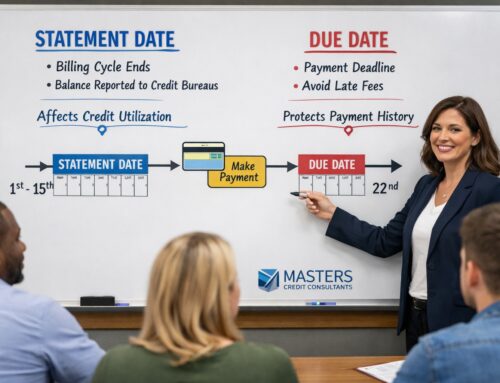
Why Did My Credit Card Issuer Lower My Credit Limit After I Made a Large Payment?
If you’ve ever wondered, “Why did my credit card issuer lower my credit limit after I made a large payment?”—you’re not alone. Many consumers experience this confusing situation right after doing something positive for their credit. It seems backward: you make a large payment to reduce your balance, and suddenly, your available credit drops.
This article explains the reasons behind this common issue, how it can affect your credit score, and—most importantly—what you can do about it. We’ll also share how Masters Credit Consultants can help you restore your credit health and prevent future surprises.
Common Reasons Credit Card Issuers Lower Limits After Large Payments
Credit Risk Review Triggers After Account Changes
Credit card companies often conduct periodic reviews of customer accounts. When you make a large payment, the issuer’s system might flag that action as unusual behavior. This can trigger a risk reassessment that results in a lower limit—especially if your past balances were high.
While it might seem unfair, this automated review is meant to manage the issuer’s overall exposure to risk. If your account previously carried high utilization and then dropped quickly, the system might interpret it as a potential account closure or financial instability, prompting the credit limit decrease.
Drastic Spending or Payment Pattern Changes
If you recently changed your payment pattern—like going from minimum payments to a large lump-sum payoff—your issuer may treat that as a red flag. Creditors prefer consistency. So when they see a sudden deviation, even a good one, it can temporarily affect your perceived creditworthiness.
This is one of the main answers to why did my credit card issuer lower my credit limit after I made a large payment?—your activity changed too suddenly for their risk models.
High Utilization History or Decreased Usage
Even after making a large payment, your previous utilization history may still influence your credit profile. If you used most of your limit before paying it down, the issuer may proactively reduce your limit to prevent similar future usage.
Alternatively, if you pay off your balance and stop using the card frequently, the lender may lower your limit due to decreased activity—a common cause behind the question why did my credit card issuer lower my credit limit after I made a large payment?
External Credit Score or Report Changes
Sometimes, the reduction isn’t tied to your large payment at all. Issuers regularly pull soft inquiries on your credit to assess your overall credit health. If other accounts show late payments, rising debt, or score drops, your issuer may respond by tightening your credit line.
That’s why keeping your credit reports accurate and scores consistent across all three bureaus is critical. If you spot inaccurate information, Masters Credit Consultants can help dispute and correct those errors professionally.
How a Lower Credit Limit Affects Your Credit Profile
Increased Utilization Ratio
Ironically, when your credit limit drops, your credit utilization ratio can spike—even if you owe less money. For example, if your limit drops from $5,000 to $2,000 and you still owe $1,000, your utilization jumps from 20% to 50%. That can lower your credit score significantly.
This explains why so many people asking, why did my credit card issuer lower my credit limit after I made a large payment, also see a credit score drop shortly after.
Potential Impact on FICO and VantageScores
Both major scoring models—FICO and VantageScore—treat utilization as a critical scoring factor. Even a slight increase can affect your approval odds for loans or credit cards. That’s why consistent monitoring and credit repair assistance are essential after any major account change.
What to Do If Your Credit Card Limit Was Lowered After a Large Payment
Step 1 — Contact Your Issuer Directly
Always call your credit card company and ask for details. Politely inquire: “Can you explain why my credit limit was lowered after I made a large payment?” In some cases, they’ll restore part—or even all—of your previous limit if you maintain consistent usage and timely payments afterward.
Step 2 — Keep Your Account Active
One of the best ways to prevent further limit cuts is to keep your card active. Use it for small purchases and pay it off each month. This shows lenders you’re engaged and financially responsible, reducing the risk of another reduction.
Step 3 — Monitor All Three Credit Bureaus
Use a reputable credit monitoring service like IdentityIQ for 3-bureau reports and daily alerts. IdentityIQ offers refreshed scores every 30 days, dark web monitoring, and $1,000,000 identity theft insurance—making it easier to track changes after your limit is lowered. https://www.identityiq.com/securepreferred.aspx?offercode=431295SH
Step 4 — Get Professional Credit Repair Assistance
If your score dropped or errors appear after your limit was lowered, it’s time to act. Masters Credit Consultants can:
Dispute inaccurate or outdated credit information
Provide professional strategies to rebuild your credit
Help restore your utilization balance with expert recommendations
Why Proactive Credit Repair Matters
Credit card issuers use algorithms that monitor your entire credit ecosystem. A small issue on one report—like a limit drop or utilization change—can cascade across your accounts. Working with Masters Credit Consultants ensures you’re not only fixing errors but strengthening your overall credit posture.
This is why so many clients choose Masters Credit Consultants when they ask: Why did my credit card issuer lower my credit limit after I made a large payment?
How YMA Financial Can Help Build Business Credit Stability
If you’re a business owner facing the same issue with business credit cards or lines of credit, YMA Financial can help. Their business consulting experts assist entrepreneurs in:
Building strong business credit profiles
Securing funding and startup capital
Creating financial strategies that prevent account instability
Interlinking high-value pages between Masters Credit Consultants and YMA Financial boosts both domain authorities and strengthens your SEO footprint.
Additional Helpful Links
Credit Repair Services: https://www.masterscredit.com/credit-repair-services/
Denied for Credit and Don’t Know Why? https://www.masterscredit.com/denied-for-credit-and-dont-know-why/
Free Credit Consultation: https://www.masterscredit.com/sign-up/
Business Consulting Services: https://www.ymafinancial.com/business-consulting-services/
Building Business Credit with YMA Financial: https://www.ymafinancial.com/building-business-credit-with-yma-financial/
Business Startup Funding: https://www.ymafinancial.com/business-startup-funding/
Conclusion: Responding the Right Way
If you’re wondering why your credit card issuer lowered your credit limit after you made a large payment, remember—it’s not personal. It’s a mix of automated algorithms, spending patterns, and risk controls. What matters now is how you respond.
Stay calm and contact your issuer.
Monitor your utilization closely.
Keep your accounts active and consistent.
And most importantly, work with experts who can guide you back to stronger credit health.
Promotional Section: Schedule Your Free Credit Consultation
If your credit card limit has been reduced and your credit score affected, Masters Credit Consultants can help you regain control and restore your credit.
📞 Phone: 1-844-620-8796
🌐 Website: www.masterscredit.com
📅 Schedule Your Free Credit Consultation:
https://masterscreditconsultantsfreeconsultationbooknow.as.me/schedule/912546ad/appointment/31582691/calendar/6643355








Leave A Comment